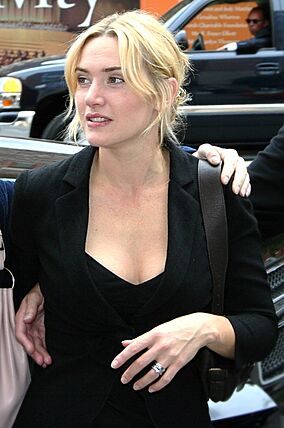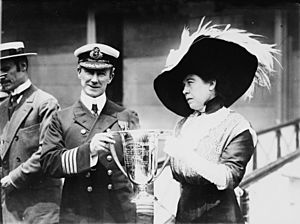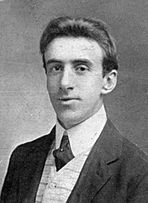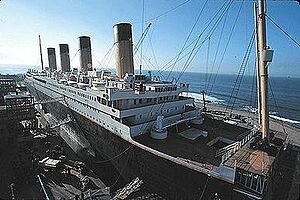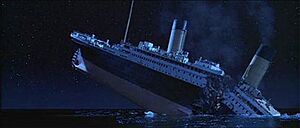Titanic (1997 movie) facts for kids
Quick facts for kids Titanic |
|
|---|---|
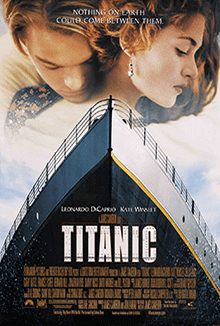
Theatrical release poster
|
|
| Directed by | James Cameron |
| Produced by |
|
| Written by | James Cameron |
| Starring | |
| Music by | James Horner |
| Cinematography | Russell Carpenter |
| Editing by |
|
| Studio | |
| Distributed by |
|
| Release date(s) | November 1, 1997 (Tokyo) December 19, 1997 (United States) |
| Running time | 195 minutes |
| Country | United States |
| Language | English |
| Budget | $200 million |
| Money made | $2.264 billion |
Titanic is a famous American epic historical romance movie from 1997. It was written and directed by James Cameron. The film tells a fictional love story set against the real-life sinking of the RMS Titanic in 1912. Leonardo DiCaprio plays Jack Dawson, a poor artist, and Kate Winslet plays Rose DeWitt Bukater, a wealthy young woman. They fall in love during the ship's first and only journey. The movie also features a talented group of actors, including Billy Zane, Kathy Bates, and Bill Paxton.
James Cameron was inspired to make the film because he was fascinated by shipwrecks. He believed a powerful love story, combined with the real human tragedy, would show the disaster's true impact. Filming included exploring the actual Titanic wreck underwater. Special effects, Scale models, and computer-generated imagery (CGI) helped recreate the ship and its sinking. Titanic was the most expensive film ever made at the time.
The movie premiered in November 1997 and was released in the United States in December. It received great praise for its amazing visual effects, the actors' performances, and its emotional story. Titanic won eleven Academy Awards, including Best Picture and Best Director. It was the highest-grossing film of all time for many years. In 2017, the Library of Congress chose Titanic for preservation in the United States National Film Registry, recognizing its cultural importance.
Contents
The Story of Titanic
Searching for a Lost Treasure
In 1996, a treasure hunter named Brock Lovett and his team explore the wreck of the RMS Titanic. They are searching for a legendary necklace called the Heart of the Ocean. Instead, they find a drawing of a young woman wearing the necklace. The drawing is dated April 14, 1912, the day the Titanic sank.
An old woman named Rose Dawson Calvert sees a TV report about the discovery. She contacts Lovett, saying she is the woman in the drawing. Lovett invites Rose and her granddaughter aboard his research ship. There, Rose begins to share her incredible story of being on the Titanic.
Aboard the Grand Ship in 1912
In 1912, 17-year-old Rose DeWitt Bukater boards the Titanic in Southampton. She is with her wealthy fiancé, Cal Hockley, and her mother, Ruth. Rose is unhappy because she is expected to marry Cal, even though she doesn't love him. Her mother insists the marriage will solve their family's financial problems.
Feeling trapped, Rose considers jumping from the ship. But a kind, poor artist named Jack Dawson stops her. Jack and Rose quickly become friends. Jack soon tells Rose he has strong feelings for her. Rose, at first unsure, realizes she has fallen in love with Jack, despite her mother's and Cal's disapproval.
A Forbidden Romance and a Disaster
Rose asks Jack to draw her wearing a necklace. Afterward, they share a romantic moment together. On the forward deck, they witness the ship hitting an iceberg. They overhear officers discussing how serious the situation is.
Cal discovers Jack's drawing of Rose. He then has his bodyguard, Spicer Lovejoy, secretly place the necklace on Jack. This makes it look like Jack stole it. Jack is arrested and locked away. Cal keeps the necklace for himself.
The Ship Sinks
As the Titanic begins to sink, women and children are given priority for the lifeboats. Rose bravely rescues Jack from his cell. They return to the deck. Cal urges Rose to get into a lifeboat, claiming he and Jack will follow in another. Cal unknowingly wraps his coat, which holds the necklace, around Rose.
As her lifeboat is lowered, Rose jumps back onto the ship. She cannot leave Jack behind. Cal becomes furious and chases them through the flooding ship. He eventually gives up. Cal later gets onto a lifeboat by pretending to be a child's father.
Survival and a Promise
The ship's bow sinks, and the stern rises high into the air. Jack and Rose cling to the railing. The Titanic then breaks in two. The stern plunges into the freezing water with the remaining passengers. Jack helps Rose onto a piece of floating wood. He makes her promise to survive and live a long, full life.
Jack sadly dies from the extreme cold. Rose is eventually saved by a returning lifeboat and rescued by the RMS Carpathia. To escape Cal and her mother, Rose gives her name as Rose Dawson when she arrives in New York City.
Rose's Legacy
In the present, old Rose reveals that Cal faced financial ruin and later passed away. She tells Lovett's crew that Jack saved her in every way possible. She feels her memories are all she has left of him. Moved by her story, Lovett gives up his search for the necklace.
Alone on the ship's stern that night, Rose drops the Heart of the Ocean necklace into the sea, right above the Titanic wreck. Later, in her bed, photographs show a life of freedom and adventure. This life was inspired by Jack. In a dream-like scene, a young Rose reunites with Jack at the Titanics Grand Staircase. All the passengers and crew who died applaud them.
Meet the Characters
Fictional Characters
- Leonardo DiCaprio as Jack Dawson: A poor, adventurous artist who wins tickets for the Titanic in a poker game. He falls in love with Rose.
- Kate Winslet as Rose DeWitt Bukater: A 17-year-old from a wealthy family. She is unhappy with her arranged engagement and finds freedom with Jack.
- Gloria Stuart as the modern-day Rose Dawson Calvert: The elderly Rose who tells her story of the Titanic.
- Billy Zane as Caledon "Cal" Hockley: Rose's arrogant fiancé, who is very jealous of Jack.
- Frances Fisher as Ruth DeWitt Bukater: Rose's mother, who wants Rose to marry Cal for the family's social standing.
- Bill Paxton as Brock Lovett: A treasure hunter in the present day, searching for the Heart of the Ocean.
- Suzy Amis as Elizabeth "Lizzy" Calvert: Rose's granddaughter, who learns about her grandmother's past.
- Danny Nucci as Fabrizio De Rossi: Jack's best friend, who travels with him on the Titanic.
- David Warner as Spicer Lovejoy: Cal's bodyguard, who watches Rose and Jack.
- Jason Barry as Tommy Ryan: An Irish third-class passenger who becomes friends with Jack and Fabrizio.
- Alexandrea Owens-Sarno as Cora Cartmell: A young girl who dances with Jack at a party.
Historical Characters
The film also includes characters based on real people who were on the Titanic:
- Kathy Bates as Margaret "Molly" Brown: A strong and kind first-class passenger. She was known as the "Unsinkable Molly Brown" for her bravery during the sinking.
- Victor Garber as Thomas Andrews: The kind and modest builder of the Titanic. He understood the ship's fate after the collision.
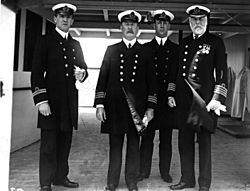
- Bernard Hill as Captain Edward John Smith: The captain of the Titanic, on his final voyage before retirement.
- Jonathan Hyde as J. Bruce Ismay: The managing director of the White Star Line. He was criticized for surviving the disaster.
- Eric Braeden as John Jacob Astor IV: A very wealthy first-class passenger.
- Bernard Fox as Colonel Archibald Gracie IV: A first-class passenger.
- Michael Ensign as Benjamin Guggenheim: A wealthy mining businessman.
- Jonathan Evans-Jones as Wallace Hartley: The ship's bandmaster, who played music to comfort passengers as the ship sank.
- Ewan Stewart as First Officer William Murdoch: The officer on the bridge when the Titanic hit the iceberg. During the chaos, he struggled to maintain order.
- Jonathan Phillips as Second Officer Charles Lightoller: The most senior officer to survive the disaster.
- Ioan Gruffudd as Fifth Officer Harold Lowe: The only officer who returned with a lifeboat to rescue survivors from the water.
- Lew Palter and Elsa Raven as Isidor and Ida Straus: A devoted elderly couple who chose to stay together on the ship.
- Martin Jarvis as Sir Cosmo Duff-Gordon and Rosalind Ayres as Lady Duff-Gordon: A wealthy couple who survived in a lifeboat.
- Paul Brightwell as Quartermaster Robert Hichens: The helmsman at the time of the collision.
- Liam Tuohy as Chief Baker Charles Joughin: The ship's baker, known for his incredible survival story.
Making the Movie
Director's Vision and Research
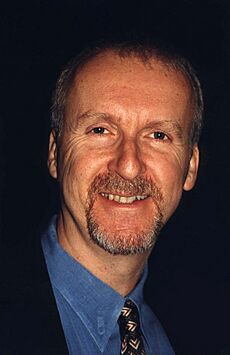
James Cameron had always been fascinated by shipwrecks. He saw the Titanic as the "Mount Everest of shipwrecks." He wanted to make a film that would bring the real history to life. Cameron pitched the idea as "Romeo and Juliet on the Titanic."
To make the film as accurate as possible, Cameron and his team did a lot of research. They even made 12 trips to the actual Titanic wreck deep in the Atlantic Ocean. This experience made them feel a great responsibility to tell the story with emotional truth.
Building the Ship and Sets
The filmmakers got original blueprints from Harland & Wolff, the Titanics builders. They built a huge replica of the ship at a new studio in Mexico. This replica was almost full-sized and could even tilt to show the sinking. A massive water tank was built to create the ocean scenes.
The movie's interior sets, like the famous Grand Staircase, were recreated with amazing detail. Craftsmen used photographs and plans to make everything look just like the real ship. Even small items like cutlery had the White Star Line crest. Two Titanic historians helped ensure all historical details were correct.
Choosing the Actors
For the main roles, Cameron wanted actors who could truly capture the spirit of the characters.
- Leonardo DiCaprio was chosen to play Jack Dawson. Cameron saw his ability to bring a joyful energy to the role.
- Kate Winslet was cast as Rose DeWitt Bukater. She was very determined to get the part, even sending Cameron notes and calling him to express her passion for the character.
- Gloria Stuart, at 87 years old, played the elderly Rose. Cameron felt her lively spirit connected perfectly with Kate Winslet's portrayal of young Rose.
Filming Challenges
Filming Titanic was a huge and difficult task. Many scenes involved actors spending hours in cold water, leading to some getting sick. Stunt performers faced risks, and some even broke bones.
One memorable scene was Jack drawing Rose. Kate Winslet posed for James Cameron, who did the actual sketch. This scene was one of the first filmed between DiCaprio and Winslet, adding a natural nervousness to their interaction.
The film was very expensive to make. The director, James Cameron, worked hard to ensure his vision for the movie was kept, even giving up his own salary to help with costs. Paramount Pictures and 20th Century Fox partnered to finance the film.
Amazing Special Effects
Cameron wanted to create the most realistic sinking scenes ever. He used advanced computer-generated imagery (CGI) and detailed miniature models. Digital water and smoke were added to make the ship's destruction look real.
A huge tank was used for sinking interior sets. For example, 90,000 gallons of water were dumped into the Grand Staircase set to show it flooding. The scenes of people in the freezing Atlantic were filmed in a special tank. The movie showed the ship breaking in two before sinking, which was a more accurate depiction than earlier films.
The Heart of the Ocean Necklace
For the famous Heart of the Ocean necklace, jewelers created an Edwardian-style prop using cubic zirconias and white gold. After the film's success, a real version was made with a large Ceylon sapphire and diamonds.
Movie Music
A Memorable Soundtrack
James Horner composed the beautiful music for Titanic. He chose the Norwegian singer Sissel Kyrkjebø for the haunting vocals heard throughout the film.
Horner also secretly wrote the movie's famous theme song, "My Heart Will Go On," with Will Jennings. Director James Cameron initially didn't want any songs in the film. But after hearing Celine Dion's demo, he approved it. The song became a massive hit and helped the soundtrack become the best-selling album of 1998.
Release and Success
Theatrical Release
Titanic was initially planned for a summer 1997 release. However, due to the complex special effects, its release was moved to December 19, 1997. This led to some speculation, but early positive reviews quickly built excitement.
The film premiered at the Tokyo International Film Festival in November 1997. The official Hollywood premiere followed in December. Titanic quickly became a global phenomenon.
Home Entertainment
Titanic was released on VHS in September 1998, selling millions of copies and becoming a best-seller. A DVD version followed in 1999. Later, special collector's editions with extra features were released in 2005 and 2007.
In 2012, Titanic was released on Blu-ray and Blu-ray 3D. It also became available on streaming services like Netflix and Paramount+ in recent years.
Awards and Recognition
Winning Big at the Oscars
Titanic received many awards and honors. At the Golden Globes, it won Best Motion Picture – Drama, Best Director, Best Original Score, and Best Original Song.
At the 70th Academy Awards, Titanic was nominated for fourteen Academy Awards, tying a record. It won eleven of these, including the prestigious Best Picture and Best Director. This tied the record for the most Academy Awards won by a single film.
Other Honors
The song "My Heart Will Go On" won several Grammy Awards, including Record of the Year and Song of the Year. The film's soundtrack became the best-selling orchestral soundtrack of all time.
Titanic has also been recognized by the American Film Institute multiple times. It appeared on lists for thrilling films, love stories, movie songs, and epic films.
| AFI's 100 Years ... 100 | Rank | Source | Notes |
|---|---|---|---|
| Thrills | 25 | A list of the top 100 thrilling films in American cinema, compiled in 2001. | |
| Passions | 37 | A list of the top 100 love stories in American cinema, compiled in 2002. | |
| Songs | 14 | A list of the top 100 songs in American cinema, compiled in 2004. Titanic ranked 14th for Céline Dion's "My Heart Will Go On". | |
| Movie quotes | 100 | A list of the top 100 film quotations in American cinema, compiled in 2005. Titanic ranked 100th for Jack Dawson's yell of "I'm the king of the world!" | |
| Movies | 83 | A 2007 (10th anniversary) edition of 1997's list of the 100 best films of the past century. Titanic was not eligible when the original list was released. | |
| AFI's 10 Top 10 | 6 | The 2008 poll consisted of the top ten films in ten different genres. Titanic ranked as the sixth-best epic film. |
Legacy and Re-releases
3D Conversion and Anniversaries
In 2012, for the 100th anniversary of the Titanics maiden voyage, the film was re-released in 3D. This conversion took 60 weeks and $18 million to complete. One interesting change was made to a scene where Rose looks at the night sky. An astrophysicist, Neil deGrasse Tyson, pointed out that the original star pattern was incorrect. So, the scene was updated to show an accurate view of the sky from the North Atlantic in 1912.
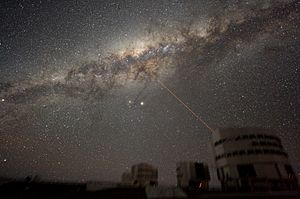
The 3D re-release was very successful, earning hundreds of millions of dollars worldwide. It remains the highest-grossing re-released film of all time.
The film was also re-released in cinemas for its 20th anniversary in 2017 and its 25th anniversary in 2023. These special screenings allowed new audiences to experience the movie on the big screen.
Titanic Live
Titanic Live is a special event where a 130-piece orchestra, choir, and Celtic musicians perform James Horner's score live while the film is shown. This unique experience premiered in London in 2015.
Titanic in Other Media
- In 1998, a computer game called James Cameron's Titanic Explorer was released. It was an educational game about the ship's history and the wreck.
- In 2020, a board game based on the film, titled Titanic: The Game, was released.
See also
 In Spanish: Titanic (película de 1997) para niños
In Spanish: Titanic (película de 1997) para niños
- List of Academy Award records
- List of films by box office admissions
- Titanic: Music from the Motion Picture
- List of films about the Titanic
- Britannic (film)
 | William L. Dawson |
 | W. E. B. Du Bois |
 | Harry Belafonte |


